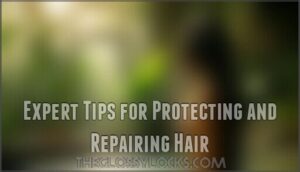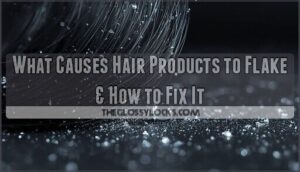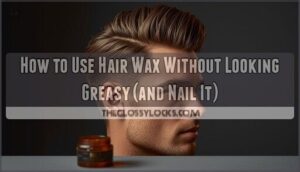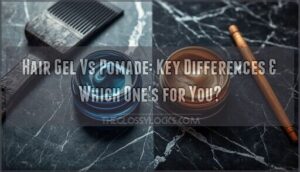This site is supported by our readers. We may earn a commission, at no cost to you, if you purchase through links.

You’re battling an invisible enemy dissolved in every drop of water that touches your scalp: calcium and magnesium ions that transform your shower into a mineral deposit machine. Research shows hard water can reduce hair’s tensile strength by up to 14%, fundamentally weakening the structural integrity of each fiber.
The good news? Once you understand how these minerals interact with your hair’s cuticle layer, you can implement targeted washing techniques and treatment strategies that neutralize hard water’s damaging effects and restore your hair’s natural resilience.
Table Of Contents
- Key Takeaways
- What is Hard Water and How to Identify It?
- How Does Hard Water Affect Hair Health?
- How to Wash Hair Effectively in Hard Water
- Essential Hair Products for Hard Water
- Tools and Solutions to Reduce Hard Water Damage
- Expert Tips for Protecting and Repairing Hair
- Frequently Asked Questions (FAQs)
- What are the long-term effects of hard water on my hair?
- What are the best products to use when dealing with hard water?
- How can I help my hair recover from hard water damage?
- Is there a way to prevent hard water buildup on my hair?
- Are there any natural treatments for hard water hair?
- How often should I use chelating shampoo?
- Does hard water affect curly hair differently?
- Can children wash their hair in hard water?
- Will hard water make dandruff worse over time?
- Conclusion
Key Takeaways
- Hard water reduces hair’s tensile strength by up to 14% through calcium and magnesium deposits that form a stubborn film on each strand, blocking moisture penetration and compromising structural integrity.
- Chelating shampoos containing EDTA are four times more effective than clarifying shampoos at removing mineral buildup and should be used every one to two weeks, followed by deep conditioning to prevent dryness.
- Installing a showerhead filter combined with cool water rinses and acidic treatments (like diluted apple cider vinegar) creates a multi-layered defense that strips up to 75% of mineral deposits while closing hair cuticles to prevent future damage.
- Applying protective oils before washing acts as a physical barrier against hard water minerals, while leave-in conditioners afterward lock in moisture and restore the hair’s natural resilience against ongoing mineral exposure.
What is Hard Water and How to Identify It?
Hard water isn’t just a plumbing issue—it’s quietly wrecking your hair every time you shower.
Before you can fix the damage, you need to recognize the warning signs and understand what’s causing them. Here’s how to identify hard water and trace it back to the source.
Signs Your Water is Hard
How do you know if the water flowing through your pipes is wreaking havoc on your hair? Watch for these telltale hard water symptoms:
- Scale buildup on faucets, showerheads, and glass surfaces
- Mineral deposits that leave white, chalky residue on fixtures
- Soap and shampoo that won’t lather easily, no matter how much you use
You can confirm your suspicions with water testing kits that measure alkalinity levels and overall water quality—giving you concrete data on the mineral buildup affecting your hair.
Common Causes of Hard Water
Hard water doesn’t just appear out of nowhere—it starts its mineral-loading journey the moment rain hits the ground and begins filtering through layers of limestone, chalk, and gypsum-rich soil.
As groundwater flow moves through these geological factors, it dissolves calcium and magnesium—the culprits behind mineral buildup. The longer water travels through mineral-rich soil composition, the harder it becomes, ultimately affecting your water quality and triggering those frustrating hard water effects on hair you’ve been noticing.
How Does Hard Water Affect Hair Health?
Hard water doesn’t just sit on your hair—it changes it from the inside out. The minerals in your water create a cascade of problems that affect everything from strand strength to how your scalp feels.
Let’s break down exactly what’s happening to your hair and why it matters.
Mineral Buildup and Hair Damage
When calcium and magnesium ions latch onto your hair shaft like unwelcome houseguests, they form a stubborn film that blocks moisture from penetrating where it’s needed most. This mineral buildup creates a cascade of damage that compromises hair porosity and weakens structural integrity.
Hard water effects on hair include:
- Reduced tensile strength by 9–14%, making strands prone to hair breakage
- Blocked cuticle layers that prevent damage repair and scalp protection
- Dull, rough texture requiring chelating shampoos for mineral buildup removal
- Compromised treatments unless you incorporate water filtration or mineral removal strategies
Effects on Scalp and Hair Texture
Beyond structural damage, the mineral film coating each strand transforms your scalp environment and alters how your hair behaves from root to tip. Mineral deposits trigger scalp irritation and flaking, while compromising hair porosity—preventing natural oils from conditioning effectively.
Hard water damage manifests as persistent frizz, tangling, and coarse hair texture that resists styling. Mineral buildup disrupts your hair’s acid mantle, leaving strands vulnerable and demanding targeted texture restoration strategies.
Hair Loss and Shedding Risks
Though hard water doesn’t directly trigger follicle miniaturization or permanent hair loss, the mineral damage weakens your hair’s structural integrity—reducing tensile strength by up to 14%. This leads to increased hair breakage and shedding during styling.
Persistent scalp inflammation from mineral buildup can prolong the telogen phase, causing diffuse shedding while clogging follicles and compromising follicle health.
A water softener becomes essential for hair damage prevention when breakage escalates. Understanding hair loss causes is vital to addressing the issue effectively.
How to Wash Hair Effectively in Hard Water
Washing your hair in hard water requires a different approach than your usual routine.
The right techniques can minimize mineral deposits and protect your strands from damage.
Here’s how to adapt your washing method when hard water is unavoidable.
Best Washing Techniques
If you’ve been scrubbing and conditioning your hair religiously but still feel like you’re fighting a losing battle, your washing technique—not your effort—might be the real culprit.
Start with clarifying shampoos that target mineral removal, focusing on your scalp where buildup concentrates. Work products through methodically, allowing chelating formulas time to bind with calcium deposits.
Follow with pH balancing treatments—this step prepares your strands to actually absorb moisture instead of repelling it, transforming hard water from hair damage catalyst into manageable challenge.
Rinsing With Purified or Bottled Water
Your final rinse—the step most people skip—might be the key factor that actually lets your conditioner do its job instead of sitting on a mineral-coated surface. Here’s how purified water benefits trump hard water every time:
- Keep bottled water in your shower for final rinses that restore pH balance
- Target mineral removal where it matters—the last 30 seconds of contact
- Invest in a showerhead filter for soft water alternatives without the hassle
- Notice improved water quality immediately through smoother, shinier strands
Filtered water rinses strip residual calcium deposits that regular water leaves behind.
Adjusting Water Temperature for Hard Water
Hot water might feel luxurious, but when combined with hard water’s mineral load, it opens your hair cuticles wide enough to trap every bit of calcium and magnesium floating through your pipes.
Cool or lukewarm temperature settings close those cuticles back down, preventing mineral deposits from embedding themselves into each strand.
Shower head filters paired with thermal regulation give you water quality and hair health protection—soft water treatment without the full water softener investment.
Essential Hair Products for Hard Water
The right products can break through mineral deposits and restore your hair’s natural balance.
You’ll need targeted formulas that address buildup while protecting against dryness and damage.
Here’s what actually works when you’re dealing with hard water.
Clarifying and Chelating Shampoos
Chelating shampoos contain specialized chelating agents like EDTA that bind mineral deposits from hard water—think of them as magnets pulling calcium and magnesium off your hair shaft. They’re up to four times more effective than clarifying shampoos at mineral removal, though both tackle product buildup.
Use chelating formulas every one to two weeks for hair detox, then follow with deep conditioning to protect scalp health and prevent dryness from overuse. Understanding hair care basics is essential for maintaining healthy hair in hard water areas.
Acidic Rinses (Vinegar, Lemon)
Diluted apple cider vinegar acts like a reset button for hard water hair. Clinical studies show a single rinse can strip away up to 75% of mineral deposits that clarifying shampoos leave behind.
Mix one tablespoon of apple cider vinegar with three cups of water for pH balance restoration, or substitute lemon juice for lighter hair tones.
This acidic rinse benefits your scalp by dissolving calcium buildup while restoring your hair’s natural shine without harsh chemicals.
Moisturizing Masks and Leave-in Conditioners
Once you’ve cleared away the mineral residue, hard water’s drying effects still demand active defense—deep conditioning treatments become non-negotiable rather than optional. Your hair repair strategy should include:
- Intensive masks applied weekly to restore moisture lock
- Leave-in conditioners formulated with humectants
- Protein treatments to rebuild weakened strands
- Oil-based serums that seal cuticles against future mineral deposits
These hair conditioning products work synergistically—the masks penetrate deeply while leave-in treatments provide continuous protection between washes.
Purple Shampoo for Blonde or Gray Hair
Blonde and gray hair face a unique challenge when exposed to hard water—iron and copper particles bond aggressively to light-colored strands, creating stubborn brassy or greenish tones that standard purple shampoos weren’t originally designed to combat.
You’ll need a dual-action approach: start with clarifying shampoos to strip mineral deposits, then follow with purple toning treatments for color correction.
This blonde maintenance routine delivers toner benefits that restore cool, neutral hues while addressing hard water’s specific assault on gray hair care and overall hair color integrity.
Tools and Solutions to Reduce Hard Water Damage
If hard water is wreaking havoc on your hair, the right tools can make all the difference. From filtration systems to whole-house solutions, these three approaches address mineral buildup at the source.
Let’s break down what actually works—and what fits your lifestyle.
Showerhead Water Filters
If you’re ready to tackle hard water damage head-on without overhauling your entire plumbing system, a showerhead filter might be your most practical first move. These water filtration devices trap minerals before they touch your strands, offering immediate hard water solutions.
Showerhead installation takes minutes, though filter replacement every 3–6 months is essential for consistent water purification. It’s a straightforward water softening solution that protects your hair while filter maintenance remains minimal.
Installing a Water Softener System
For deeper Water Softening Solutions, a whole-house Water Softener addresses Hard Water at the source. Ion exchange systems remove up to 99% of calcium and magnesium, protecting your hair and cutting household costs—families save around $1,550 annually.
Water Softener Costs range from $200 to $6,000 depending on capacity, while Salt-Free Options like conditioners offer eco-conscious alternatives.
Water Testing determines your System Maintenance needs, and the Installation Process usually runs $1,500 on average for complete Water Filtration coverage.
Eco-Friendly and DIY Water Treatment Options
You don’t need to break the bank or install heavy-duty systems to fight hard water—there are budget-friendly, planet-conscious fixes that work wonders right from your bathroom.
Try DIY Purifiers like citric acid rinses or Natural Conditioners such as diluted apple cider vinegar for effective Water Filtration without chemicals.
Green Treatments and Homemade Hair Treatments offer Eco Softeners that support Ecofriendly Hair Care while tackling Hard Water buildup naturally.
Expert Tips for Protecting and Repairing Hair
Protecting your hair from hard water damage requires more than just the right products—it demands a strategic approach to prevention and repair. The following expert tips will help you minimize mineral buildup, strengthen compromised strands, and maintain healthy hair even in challenging water conditions.
These methods work together to create a complete defense against the ongoing effects of hard water exposure.
Preventing Future Mineral Buildup
Stopping mineral buildup before it starts is far easier—and less damaging—than trying to reverse months of accumulated deposits. Your best defense combines consistent water filtration with strategic product rotation.
Here’s your buildup prevention protocol:
- Use chelating shampoos weekly to intercept hard water minerals before they bond to your hair shaft
- Install a showerhead filter to reduce mineral exposure at the source—this is your first line of hair protection
- Alternate clarifying shampoos with moisturizing treatments to maintain scalp care without stripping natural oils
Regular mineral removal prevents the dryness and brittleness that weakens hair over time.
Oil Pre-Treatments and Leave-Ins
Coating your strands with protective oil before you even step into the shower creates a physical barrier that repels hard water minerals like a raincoat deflects downpour. Apply coconut, argan, or jojoba oil from mid-length to ends as a pre-shampoo treatment.
After washing, lock in moisture with a leave-in conditioner formulated to maintain your hair’s natural oil balance against mineral assault.
Adopting a No Poo or Natural Hair Care Routine
Shifting to a no poo (no shampoo) or natural hair care routine can actually soften hard water’s harsh impact by eliminating sulfates that strip your hair’s protective sebum layer, which naturally shields strands from mineral deposits.
Natural hair care methods like baking soda rinses or clay washes work as gentle cleansing alternatives that won’t fight against your scalp’s mineral balance.
Think of it as a hair detox—you’re giving your strands breathing room to recalibrate after years of chemical buildup, making the no poo method benefits especially powerful in hard water zones.
When to See a Hair Specialist
Sometimes home remedies just won’t cut it—persistent Scalp Irritation, unexplained Hair Loss, or stubborn Mineral Buildup that won’t budge despite clarifying shampoos signal it’s time for a Specialist Referral.
Hard Water can mask deeper Hair Loss Causes like hormonal imbalances or nutritional deficiencies. If you’re experiencing ongoing Hair Damage despite following Hair Damage Prevention strategies, a trichologist or dermatologist can pinpoint what’s really happening and create a Hair Loss Treatment plan customized to your Hair Health needs.
Frequently Asked Questions (FAQs)
What are the long-term effects of hard water on my hair?
Over time, hard water causes progressive hair damage through persistent mineral buildup. Calcium and magnesium deposits weaken hair structure, leading to breakage, increased hair thinning, and chronic scalp irritation.
Color fading accelerates as mineral deposits interfere with hair health at the follicle level.
What are the best products to use when dealing with hard water?
Chelating and clarifying shampoo benefits shine when battling mineral buildup—these hard water shampoos strip calcium and magnesium deposits your regular formula can’t touch.
Pair them with shower head water filters for double defense, then seal moisture back in using softening conditioners and weekly hair masks for lasting hair care in hard water.
How can I help my hair recover from hard water damage?
Hair restoration begins with mineral removal through chelating shampoos that strip calcium and magnesium deposits.
Follow with deeply moisturizing masks containing proteins and oils. Switch to softened water immediately—damage reversal accelerates once hard water exposure stops.
Consider professional hair treatment for severe mineral buildup.
Is there a way to prevent hard water buildup on my hair?
Prevention boils down to three strategies: installing hard water filters at your showerhead, applying protective oils before washing, and using chelating shampoos weekly to stop mineral buildup before it damages your hair and scalp.
Are there any natural treatments for hard water hair?
Looking for organic solutions to combat mineral buildup? Natural remedies like apple cider vinegar rinses excel at pH balancing and mineral removal.
Herbal treatments, chelating lemon juice, and clarifying aloe vera offer powerful hard water hair care without harsh chemicals—perfect for natural hair care routines focused on hair damage prevention.
How often should I use chelating shampoo?
Use chelating shampoo once or twice weekly if you have hard water—this chelating frequency prevents mineral buildup without stripping hair. Hair mineral deposits respond well to EDTA-based chelating agents, but overuse compromises moisture.
Rotate with gentle cleansing products between treatments. Adjust your shampoo rotation based on buildup removal needs.
Does hard water affect curly hair differently?
Yes, curly hair texture experiences amplified hard water damage. The higher hair porosity of curls allows mineral deposit penetration deeper into strands, worsening mineral buildup.
This disrupts curl definition, increases frizz, and accelerates hair damage—sometimes contributing to hair loss without proper hair care in hard water.
Can children wash their hair in hard water?
Children can absolutely wash their hair in hard water—it won’t harm their scalp or hair health.
However, gentle shampoos designed for kid hair care help minimize mineral buildup and protect against hair damage.
Soft water benefits everyone, especially young scalps.
Will hard water make dandruff worse over time?
Like a Victorian-era apothecary examining tainted well water, you’ll find that hard water can indeed worsen dandruff over time.
Mineral buildup dries out your scalp, triggering irritation and flaking. The mineral sensitivity creates an itchy scalp cycle that compromises hair health and wellness, potentially contributing to hair loss.
Conclusion
Hard water once held your hair hostage—now you hold the solution. By learning how to wash hair in hard water with chelating shampoos, acidic rinses, and filtered water systems, you’ve transformed your shower from a mineral deposit factory into a restoration zone.
Your strands no longer bear the crystallized weight of calcium buildup; instead, they move freely, absorb moisture effectively, and maintain their structural integrity.
Apply these evidence-based techniques consistently, and watch your hair reclaim the resilience hard water tried to strip away.
- https://www.keratin.com/hair-care/an-examination-of-the-impact-of-hard-water-on-hair-strength-structure-and-mineral-deposition/
- https://www.pentair.com/en-us/water-softening-filtration/blog/hard-water-effects-on-hair-and-skin.html
- https://cameocollege.com/understanding-hard-water-how-it-affects-your-hair/
- https://www.hairclub.com/blog/5-tips-washing-hair-hard-water/
- https://ilesformula.com/products/hard-water-shampoo










